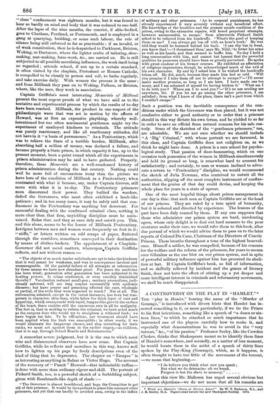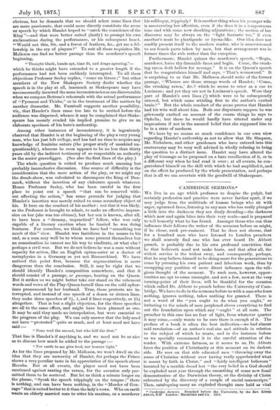A CONTROVERSY ON THE PLAY IN "HAMLET." THE "play in
Hamlet," bearing the name of the "Murder of Gonzago," is introduced with divers hints that Hamlet has in- serted something in it, or more particularly, if we tie the Prince to his first intentions, something like a speech of "a dozen or six- teen lines," to which he attached so much importance that he instructed one of the players carefully how to recite it, and especially what demonstrations he was to avoid in the "very torrent," &c., "of his passion." Professor Seeley, like the Cowden Clarkes, thinks that Shakespeare meant us to identify these lines of Hamlet's somewhere, and secondly, as a matter of less moment, he would locate them in the midst of a speech of thirty lines spoken by the Play-King (Gonzago), which, as it happens, is often thought to have too little of the movement of the torrent, —we mean that beginning,— "I do believe you think what now you speak ;
But what we do determine oft we break.
Purpose is but the slave to memory."
Against this view Mr. Malleson has urged several obvious but important objections—we do not mean that all his remarks are
* Which are Hamlet's "Dozen or Sixteen Lines?" By W. T. Malleson, HA., and J. B. Seeley, M.A. Papers read before the new Shakspere Society. 1874.
obvious, but he demands that we should select some lines that are more passionate, that could more directly constitute the scene or speech by which Hamlet hoped to "catch the conscience of the King "—and that were better suited (lastly) to prompt his own exclamations during the performance, or his subsequent boast, "Would not this, Sir, and a forest of feathers, &c., get me a fel- lowship in the cry of players?" To suit all these requisites Mr. Malleson can find no better passage than the murderer's speech beginning,
" Thought black, hands apt, time fit, and drugs agreeing,"— which he thinks might have extended to a greater length if the performance had not been suddenly interrupted. To all these objections Professor Seeley replies, "come un Greco ;" but other members of the New Shakspere Society doubt whether the speech is in the play at all, inasmuch as Shakespeare may have unconcernedly incurred the same inconsistencies as are discoverable when we compare Bottom's rehearsals with the actual performance of "Pyramus and Thisbe," or in the treatment of like matters by another dramatist. Mr. Furnivall suggests another possibility, viz., that Hamlet's lines came too late to be recited before the audience was dispersed, whence it may be complained that Shake- speare has meanly evaded his implied promise to give us an elaborate specimen of his hero's authorship.
Among other instances of inconsistency, it is ingeniously observed that Hamlet is at the beginning of the play a very young man, who has just left college, and has had no time to acquire any knowledge of feminine nature (the proper study of mankind un- questionably), whereas he soon appears to be no less than thirty years old by the indirect testimony of so respectable an authority as the senior gravedigger. (See also the first lines of the play.)
The whole question is suited to produce much amusing but probably inconclusive discussion. One source of difficulty is the consideration that the mere action of the play, or we might say the dumb-show, was calculated to discompose the King of Den- mark, without the insertion of any elaborate speech whatever. Hence Professor Seeley, who has been careful in the first place to point out a speech "that can be removed with- out affecting the action," has some grounds for judging that Hamlet's insertion was merely suited to some secondary object of his. It bore on the conduct of his mother ; not that it was likely, as the Professor is brought to admit, to make an effective impres- sion on her (she was too obtuse), but her son is known, after all, to have been a " dreamy, unpractical" fellow, who was only capable of a literary exertion when he fancied he was doing business. For ourselves, we think we have had "something too much of this" view. Hamlet was fastidious in the means to his end, as a man may well be to whom none present themselves but an assassination he cannot see his way to vindicate, or what else ? perhaps a civil war. But we do not believe he was a man without capacity for action, like an English opium-eater or a doctor of metaphysics in a Germany as yet not Bismarckised. We have noticed this point first, because the argumentation is more dangerous than the conclusion. Still, it may be right that we should identify Hamlet's composition somewhere, and that it should consist of a passage, or passages, bearing on the Queen. But it strikes us we might better take our stand on the vehement words and vows of the Play-Queen herself than on the cold aphor- isms pronounced by her husband. True, these protests are in- terrupted, and instead of one speech of a dozen or sixteen lines, they make three speeches of 34, 4, and 8 lines respectively, or 15i altogether. That is but a slight objection, for the three speeches are all to the same effect, and might have been planned as one. It may be said they made no interpolation, but were essential to the progress of the play. We can only answer that the lady need not have "protested" quite so much, and at least need not have said :—
" None wed the second, but who kill the first."
That line is Hamlet's if anything is, and we need not be so nice as to discuss how much he added to the passage :—
" Nor earth to me give food, nor heaven light."
As for the lines proposed by Mr. Malleson, we won't dwell on the idea that they are unworthy of Hamlet, for perhaps the Prince shows a very peculiar taste in his appreciation of the speech about Hecuba. But at all events, the player need not have been cautioned against ranting the verses, for the occasion only per- mitted them to be muttered. But let us think a minute longer on the phrase, "Speak the speech trippingly on the tongue ;" there is nothing, and can have been nothing, in the "Murder of Gon- zago "that is suited better to it than the lady's vows. Who on earth wants an elderly married man to utter his maxims, or a murderer his soliloquy, trippingly ? It is another thing when his younger wife is asseverating her affection, even if she does it in a tempestuous tone and with some now shocking adjurations ; the motion of her discourse may be always on the "light fantastic toe," if even another's must be plantigrade or hyena-like. Our idea does not readily present itself to the modern reader, who is unaccustomed to see female parts taken by men, but that arrangement was in former times the rule rather than the exception.
Furthermore, Hamlet quizzes the murderer's speech, "Begin, murderer, leave thy damnable faces and begin. Come, the croak- ing raven doth bellow for revenge." It is on the Queen's speech that he congratulates himself and says, "That's wormwood." It is surprising to us that Mr. Malleson should write of the former passage, "Whence are those strange words of Hamlet; Come, the croaking raven,' &c.? which he seems to utter as a cue to Lucianus; and yet they are not in Lucianus's speech. Were they part of Hamlet's own lines (!) which were to be subsequently uttered, but which came whirling first to the author's excited brain?" But the whole conduct of the scene proves that Hamlet had his wits well about him. Both our disputants suppose he was grievously excited on account of the coarse things he says to Ophelia; but these he would hardly have uttered under any impressions if not in the assured belief that she supposed him to be in a state of madness.
We have by no means so much confidence in our own view regarding Hamlet's authorship as not to allow that Mr. Simpson, Mr. Nicholson, and other gentlemen who have entered into this controversy may be very well advised in wholly refusing to bring the question to a distinct issue. Hamlet may have altered the play of Gomago as he proposed on a bare recollection of it, or in a different way when he had read it over ; at all events, he con- gratulated himself on the skill with which he had amplified it, and on the effect he produced by the whole presentation, and perhaps that is all we can ascertain with the goodwill of Shakespeare.



































 Previous page
Previous page